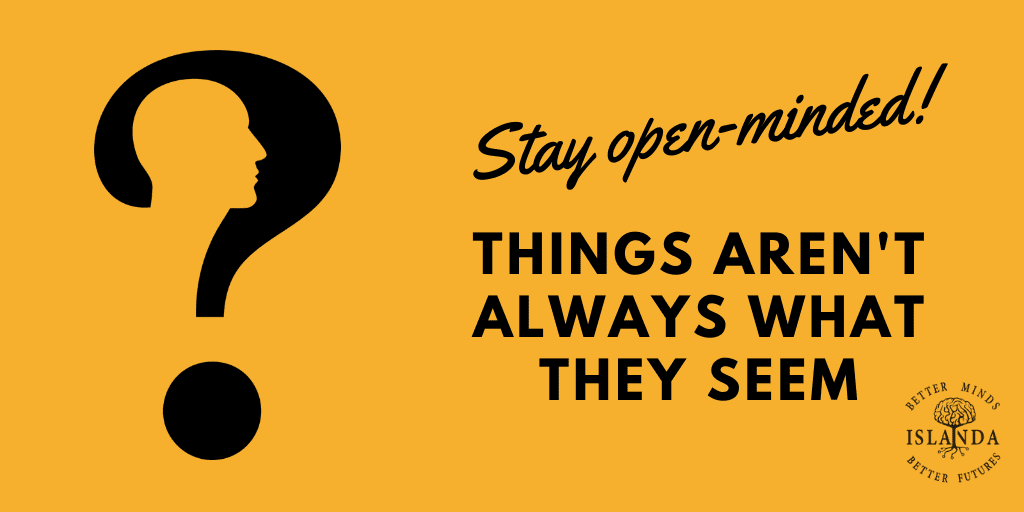“Wise men don’t judge. They seek to understand” Wei Wu Wei
Life is complicated and things aren’t always what they seem. Indeed, what we hear or see can sometimes lead us to the wrong conclusion that can lead to inappropriate actions, feelings of stress and anxiety and disharmony in relationships.
Developing a habit of being open-minded will help you to avoid jumping to incorrect conclusions that will help you make better decisions, take better actions and be more compassionate of others. Having an open mind also has other benefits:
- It is a key part of developing optimism, the EQ skill reported to have the most impact on living a fulfilled life
- It can help to reduce stress and anxiety as being open to other ideas is part of letting go of our subconscious fears and behaviour patterns such as ‘needing to be right’ or ‘being in control’
- It enables better collaboration and co-creation with others as you will be less stuck in your own point of view
- It can expand the range of options available to you when you are thinking of ways to achieve a goal or outcome as you are less likely to have discarded options that might at first appear to be inappropriate or constrained in some way
Examples of common misunderstandings
Social distancing is intended to ensure physical distancing, not social disconnection
Isolation does not always lead to loneliness – isolation is a physical state whereas loneliness is a mental state. You can be isolated and not lonely and equally, you can be in a crowd and yet feel lonely. In this period of lockdown, don’t assume that isolation is causing loneliness. Some people might enjoy their own company yet others living with their family may be feeling more lonely than ever. Check in with everyone – you may be surprised about who actually needs your support.
Pain does not lead to suffering. As Haruki Murakami says “Pain is inevitable, suffering is optional”. For example, running a marathon could be extremely painful physically, yet joyous mentally or parachuting out of an airplane could be exciting for some and terrifying for others.
Busy does not mean productive. A common limiting belief is that doing nothing is lazy and being busy is positive driving many people to be perpetually busy often at the expense of what’s important. A useful habit if you find that you are too busy to get to the things that are most important (but may not have a deadline) is to schedule time in your diary to focus on your priorities and DO NOT allow this commitment to be altered. My favourite book for improving productivity is Eat That Frog! by Brian Tracy – it’s a quick read and has some great tips.
Diversity doesn’t always mean, or lead, to inclusivity. Indeed the word itself implies that there is a divide or difference. Develop a culture of inclusivity, where people are encouraged to connect, listen to ideas from everyone regardless of role, age or anything else and be open.
Hearing doesn’t always lead to understanding. Hearing is a physical sense whereas understanding results from cognitive interpretation. Many people listen in order to respond not always with the intent to understand.
Empathy is not the same as sympathy. Empathy fuels connection and involves experiencing someone else’s feelings in an emotional way and allowing the emotions to process. Sympathy fuels disconnection and involves understanding someone else’s feelings in a cognitive way, often offering advice to ‘fix it’ which disregards the emotion and can make someone feel not listened to or fully understood.
Confidence does not mean that someone is right. We are often biased towards someone who displays confidence in themselves and what they are saying or doing and may disregard someone with less confidence who might be talking far more sense!
Aggression does not mean there is an intent to harm. Often it comes from a place of fear and anxiety with the objective of protecting yourself or someone else. Our instant reaction to aggression is to respond defensively. Next time someone is aggressive be curious first. What might they be fearful of? Is there something blocking them from achieving what they want/need?
Disagreement and conflict does not always mean disharmony or disconnection. In environments with high levels of trust, psychological safety and a common purpose it is possible for people to work together collaboratively and creatively and use the insights from different opinions to fuel growth and improvement and achieve the best outcomes.
In this new world in which we find ourselves, uncertainty is the norm so being open-minded is more important than ever. Use every opportunity to pause, let go of your own viewpoint and be open to other ideas to move forward with less anxiety about yourself, more curiosity and better connections with others.
